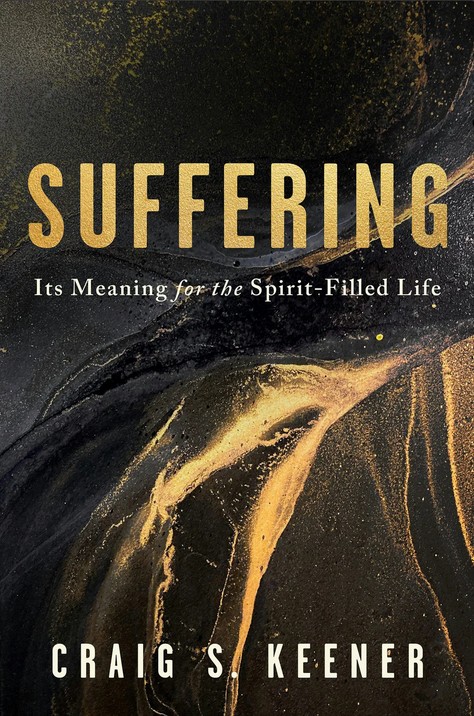In the Midst: Biblical Hope and Suffering, an interview with Craig Keener
PneumaReview.com: What led you to write a book on the subject of suffering?

Craig S. Keener, Suffering: Its Meaning for the Spirit-Filled Life (Baker Academic, November 11, 2025).
Craig Keener: Seeing what dominates our culture’s interests reinforced my feeling that the church in the U.S. is largely unprepared for suffering. Although the Bible talks a lot about suffering, sometimes when it strikes people who have heard only messages about blessing, they can feel that God has not treated them as he promised. While we have foretastes of the kingdom today, such as healings, the kingdom isn’t consummated yet. There’s still sickness and suffering and death in this world. Jesus, prophets and apostles also modeled for us how to face suffering.
PneumaReview.com: Suffering can take many forms. What kinds of suffering do you address in your book?
Craig Keener: As you say, suffering comes in many forms; I could therefore illustrate the principles with only some of them. Because persecution features dominantly in the New Testament, and it remains a living reality (even to the point of martyrdom) among Christians in many parts of the world today, that naturally features heavily in the book. But we also suffer from other sources. Some accounts from refugees fleeing other sorts of violence or suffering are heartrending. Most of us have encountered, or know others who have encountered, health or financial challenges for which our theology of healing and blessing do not, sometimes, satisfactorily address. Broken families are among the many other struggles that Christians may face.
PneumaReview.com: All people are susceptible to some forms of suffering. Should Christians expect the possibility of more suffering in their lives because of their faith?
Most of us have encountered, or know others who have encountered, health or financial challenges for which our theology of healing and blessing do not, sometimes, satisfactorily address.
PneumaReview.com: How would you respond to a person who says that suffering is a sign that one has failed God or is out of His will?
Craig Keener: That makes nonsense out of Paul’s lists of sufferings and defies the message of the cross. Granted, some kinds of sufferings are biblically normal for Christians (opposition to our faith) and some are biblically abnormal (punishment for non-Christian behaviors, 1 Pet 4:15). But we have plenty of biblical examples of God-followers who suffered from things from which God often delivers; for example, Elisha died from sickness and Paul left Trophimus sick at Miletus.
PneumaReview.com: What teachings or trends in the church today downplay the biblical teaching about suffering?
Craig Keener: I’ve not run into many people who actually teach that Christians will never suffer; but in circles that teach almost exclusively about blessings, some Christians seem to get that idea. I’ve heard some versions of “prosperity teaching” that simply mean that we should trust God to supply our needs for our lives and callings, and I certainly agree with that. But there are also the many versions (what Michael Brown calls “carnal prosperity teaching”) that claim material prosperity as a selfish promise. There are some who insist that everyone with faith will always get healed—although it’s evident that, given enough time, everybody in history, no matter how much faith, without exception, eventually dies.
Craig Keener: I want to raise awareness in the West of what so many of our brothers and sisters suffer elsewhere. I want this for their sake, so we can support them in prayer and other ways, and also for our sake—so sufferings in this age don’t take us by surprise.
PneumaReview.com: Do you think ministerial training in the West should place more of an emphasis on the possibility of one suffering for their Christian ministry?
Craig Keener: So many seminary and Bible college graduates go out ready to change the world and are out of ministry after a few years. It would help them to graduate with open eyes. Church people can be mean. We walk with many other church people through their heart-wrenching hardships. We may face opposition from various sources. A church with financial challenges (or even without them) may not pay as much as ministers can get elsewhere (I worked in a restaurant and pastored for free). We also can face discouragement when exaltation does not come as fast as social media sensations might lead us to expect. But faith means not just following God’s call or a heart for ministry when things are going well; it means trusting the God who is trustworthy no matter what.
PneumaReview.com: Please share some things that believers in the persecuted church can teach the church in America.
Persecution features dominantly in the New Testament, and it remains a living reality among Christians in many parts of the world today.
PneumaReview.com: How can we practically help others when they are suffering?
Craig Keener: It helps us to remember that the sufferings of the present are not worthy to be compared with the glory that awaits us; the struggles of this world are birth pangs (Rom 8:22) from which God will bring forth the perfect world to come. It helps to know that in God’s plan, all things work for good, for us ultimately sharing Christ’s glory and image (8:28-29). But these are things we need to learn before we suffer, because not everybody is in a good place to hear them during their suffering. In all cases, though, we can weep with those who weep (Rom 12:15). Loving people means sharing with them as fellow members of the same body, walking with them, as best as possible, in their pain. In that setting, we can also join them in seeking healing and restoration, and reminding them of the hope that we too find in the face of our brokenness.
PR
Publisher’s page: https://bakerpublishinggroup.com/products/9781540969439_suffering
Category: Biblical Studies, Fall 2025


